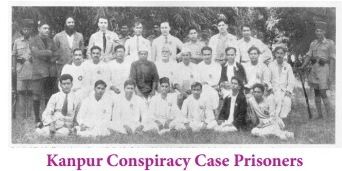kanpur conspiracy case
Kanpur Conspiracy Case has great importance in the history of Indian independence movement.
 |
| photo credit- www.brainkart.com |
What is Kanpur Conspiracy Case?
This case is popularly known as ‘Kanpur Conspiracy Case’. The British government on 21 February 1924 M.N. Rai, Muzaffar Ahmed, Shripad Amrit Dange, Usmani, Ghulam Hussain, Ramcharan Lal Sharma and Singaravel Chettiar were tried in Kanpur. The colonial government of India accused these people of hatching a conspiracy whose purpose is to establish a revolutionary organization in India and to end the sovereignty of the Emperor (British Emperor) from India.
When the trial went on, only four persons, Nalin Gupt, Usmani, Dange and Muzaffar Ahmed, were produced in the court. M. N. Rai and Sharma were not in India, Hussain became a government witness and Singaravelu Chettiar was not tried because of his illness.
The 13 persons were originally accused in the Kanpur case:
(1) M.N. Roy,
(2) Muzaffar Ahmed,
(3) Shaukat Usmani,
(4) Ghulam Hussain,
(5) SA Dange,
(6) M. Singerweller,
(7) RL Sharma,
(8) Nalini Gupta,
(9) Shamuddin Hasan,
(10) MRS Velayadhun,
(11) Dr. Manilal, Sampoornanand,
(13) Satyabhakta.
And finally chargesheet was done against 8 people:
- M.N. Roy,
- Muzaffar Ahmed,
- SA Dange,
- Nalini Gupta,
- Ghulam Hussain,
- Singerweller,
- Shaukat Usmani and
- RL Sharma.
In the end, Ghulam Hussain became a government witness. M.N. Roy and RL Sharma were charged in absentia as they were in Germany and Pondicherry (a French territory) respectively. Singravelar was released on bail as his health deteriorated. In the end the list was reduced to four.
you may read also
Non-cooperationMovement,Causes, Consequences, Chauri-Chaura Incident
When was the sentence handed down in the Kanpur conspiracy case?
The verdict of the Kanpur conspiracy trial was pronounced on 20 May 1924 and the four accused were sentenced to four years’ rigorous imprisonment.
Effect of Kanpur Conspiracy Case
Through this case, the British Government tried to create fear in the hearts of the people by stopping the attempt to establish the Communist Party and by imprisoning the Communist leaders in the heart of the people that if they do so in future, the British Government would punish them severely. Will not pay
The sentencing in the Kanpur Conspiracy Trial resulted in a result contrary to the expectations of the British Government. The British government proved to be a total failure in stopping the growing influence of the Communists. The British government, in its secret reports, admitted that after the trial, people were openly narrating what the Communists used to secretly convey to the people until now. During the trial it was also said that believing in communism is not a crime.
you may read also